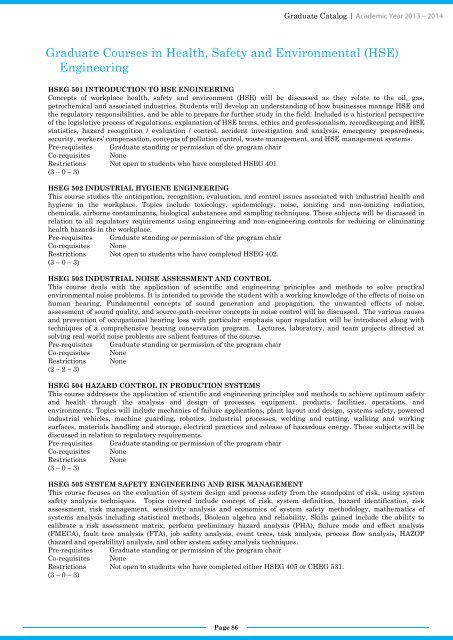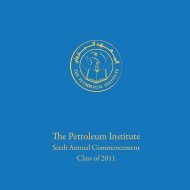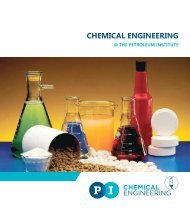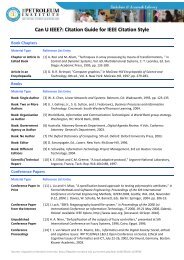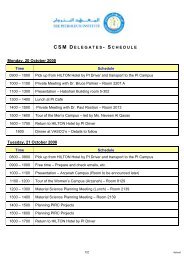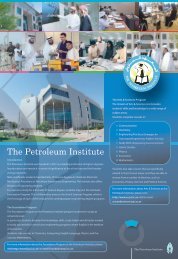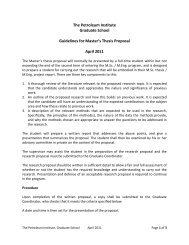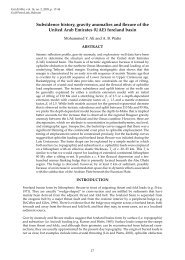GRADUATE CATALOG - The Petroleum Institute
GRADUATE CATALOG - The Petroleum Institute
GRADUATE CATALOG - The Petroleum Institute
- No tags were found...
Create successful ePaper yourself
Turn your PDF publications into a flip-book with our unique Google optimized e-Paper software.
Graduate Catalog |Graduate Courses in Health, Safety and Environmental (HSE)EngineeringHSEG 501 INTRODUCTION TO HSE ENGINEERINGConcepts of workplace health, safety and environment (HSE) will be discussed as they relate to the oil, gas,petrochemical and associated industries. Students will develop an understanding of how businesses manage HSE andthe regulatory responsibilities, and be able to prepare for further study in the field. Included is a historical perspectiveof the legislative process of regulations, explanation of HSE terms, ethics and professionalism, recordkeeping and HSEstatistics, hazard recognition / evaluation / control, accident investigation and analysis, emergency preparedness,security, workers’ compensation, concepts of pollution control, waste management, and HSE management systems.Pre-requisites Graduate standing or permission of the program chairCo-requisites NoneRestrictions Not open to students who have completed HSEG 401(3 – 0 – 3)HSEG 502 INDUSTRIAL HYGIENE ENGINEERINGThis course studies the anticipation, recognition, evaluation, and control issues associated with industrial health andhygiene in the workplace. Topics include toxicology, epidemiology, noise, ionizing and non-ionizing radiation,chemicals, airborne contaminants, biological substances and sampling techniques. <strong>The</strong>se subjects will be discussed inrelation to all regulatory requirements using engineering and non-engineering controls for reducing or eliminatinghealth hazards in the workplace.Pre-requisites Graduate standing or permission of the program chairCo-requisites NoneRestrictions Not open to students who have completed HSEG 402.(3 – 0 – 3)HSEG 503 INDUSTRIAL NOISE ASSESSMENT AND CONTROLThis course deals with the application of scientific and engineering principles and methods to solve practicalenvironmental noise problems. It is intended to provide the student with a working knowledge of the effects of noise onhuman hearing. Fundamental concepts of sound generation and propagation, the unwanted effects of noise,assessment of sound quality, and source-path-receiver concepts in noise control will be discussed. <strong>The</strong> various causesand prevention of occupational hearing loss with particular emphasis upon regulation will be introduced along withtechniques of a comprehensive hearing conservation program. Lectures, laboratory, and team projects directed atsolving real-world noise problems are salient features of the course.Pre-requisites Graduate standing or permission of the program chairCo-requisites NoneRestrictions None(2 – 2 – 3)HSEG 504 HAZARD CONTROL IN PRODUCTION SYSTEMSThis course addresses the application of scientific and engineering principles and methods to achieve optimum safetyand health through the analysis and design of processes, equipment, products, facilities, operations, andenvironments. Topics will include mechanics of failure applications, plant layout and design, systems safety, poweredindustrial vehicles, machine guarding, robotics, industrial processes, welding and cutting, walking and workingsurfaces, materials handling and storage, electrical practices and release of hazardous energy. <strong>The</strong>se subjects will bediscussed in relation to regulatory requirements.Pre-requisites Graduate standing or permission of the program chairCo-requisites NoneRestrictions None(3 – 0 – 3)HSEG 505 SYSTEM SAFETY ENGINEERING AND RISK MANAGEMENTThis course focuses on the evaluation of system design and process safety from the standpoint of risk, using systemsafety analysis techniques. Topics covered include concept of risk, system definition, hazard identification, riskassessment, risk management, sensitivity analysis and economics of system safety methodology, mathematics ofsystems analysis including statistical methods, Boolean algebra and reliability. Skills gained include the ability tocalibrate a risk assessment matrix, perform preliminary hazard analysis (PHA), failure mode and effect analysis(FMECA), fault tree analysis (FTA), job safety analysis, event trees, task analysis, process flow analysis, HAZOP(hazard and operability) analysis, and other system safety analysis techniques.Pre-requisites Graduate standing or permission of the program chairCo-requisites NoneRestrictions Not open to students who have completed either HSEG 405 or CHEG 531.(3 – 0 – 3)Page 86


